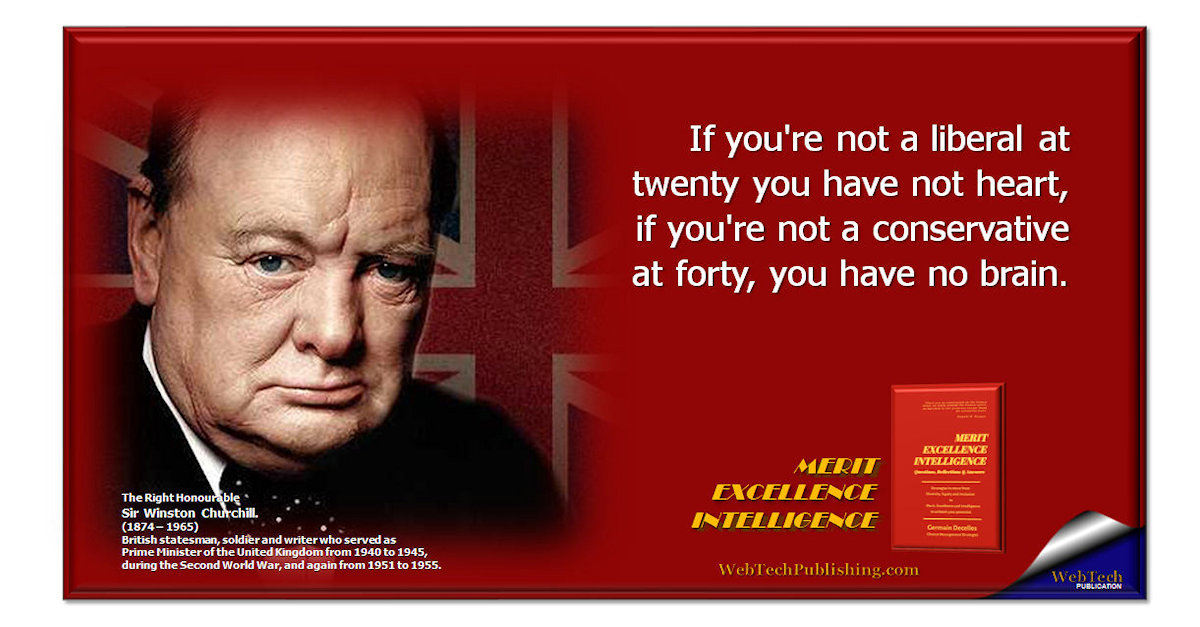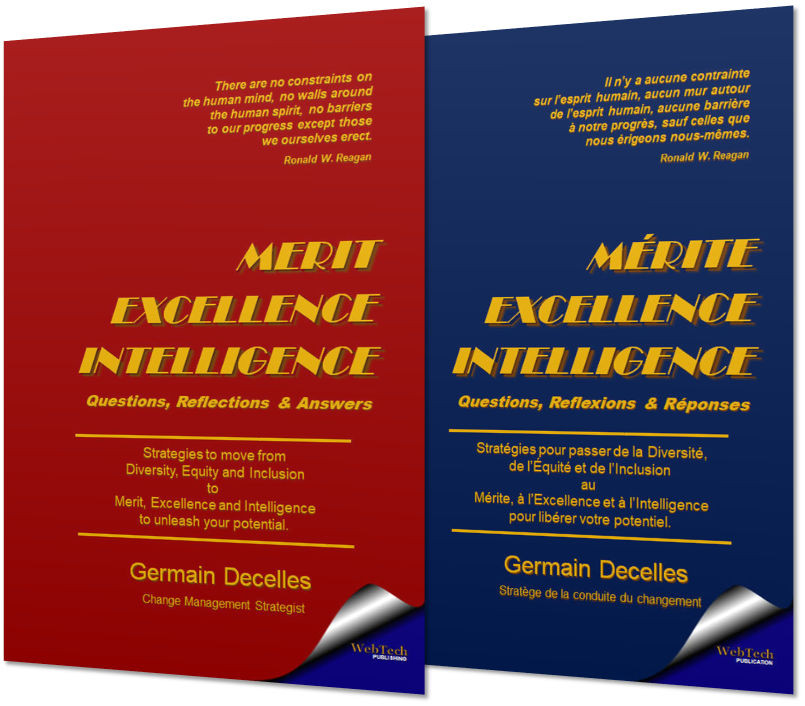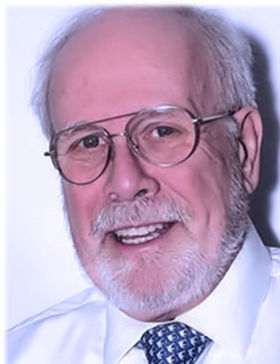|

SOCIAL, ECONOMIC AND POLITICAL
CONTEXT
An excerpt from the book MERIT, EXCELLENCE,
INTELLIGENCE, offering Questions, Reflections, and Answers to
assist readers in shifting their focus from Diversity, Equity,
and Inclusion (DEI) to an emphasis on Merit, Excellence, and
Intelligence (MEI).
The social,
economic and political context is a labyrinth to discover,
because without understanding the interlocutors, it would be
difficult to remain faithful to ourselves and pursue our
destiny.
Winston Churchill once said, « If you're not a
liberal at twenty, you have no heart; if you're not a
conservative at forty, you have no brain. »
This quote highlights the tension between emotions and
rationality in forming political, economic, religious, and
social beliefs, suggesting that both perspectives are
complementary and necessary at different stages of life.
The need to address the « elephant in the room, »
meaning there are obvious problems or difficult situations
people don't want to talk about. When people do talk about
them, they often hesitate to discuss topics like DEI
(Diversity, Equity, and Inclusion), political correctness, or
« wokeism.
»
To progress while remaining aware of your environment,
it's essential to highlight the evolution of your political,
economic, religious, and social values as you age,
transitioning from youthful idealism to pragmatism forged by
experience.o:p>
We are not equal. We are all different, sometimes very
different. This is a good thing. It allows our world to
develop, have depth, and create beauty and productivity. If
everyone were truly equal, life would be rather boring.
What we really mean is that everyone deserves the same
respect and opportunities. In this context, it's acceptable
because it makes sense.
There's also the definition of the new « social sense »
of « political correctness» and « wokeism. » To do this, we
need to ask questions to reflect and obtain answers based on
common sense.
Simple and rational, we must focus on moral accuracy
rather than political correctness, as expressed by Judge
Jeanine Pirro, which sums up what we should focus on.
The challenge lies with the family, which is the basic
unit of society and one of the most important institutions in
human life. The concept of family has evolved over time and
now takes many different forms. This transformation must be
evaluated and, if necessary, questioned.
The family plays a crucial role in society, as it is
the foundation of social order, providing the stability and
support necessary for the development of individuals and
communities.
However, this reflection doesn't stop there, as there's
also the issue of the educational challenge. Education is also
the means by which a person develops essential life skills,
learns social norms, develops judgment and reasoning, and
learns to distinguish right from wrong. This is essential for
teaching a person to use logic when making decisions and
interacting with others.
A strong educational system contributes to a nation's
economic competitiveness by equipping students with relevant
knowledge and skills. It also prepares them to enter the
workforce and contribute to the country's economy.
However, indoctrination in education is a double-edged
sword. Fundamentally, indoctrination simply means teaching
someone something without them questioning it.
In an educational system, indoctrination is the process
of instilling an ideology in a person or group through
repeated teaching without discernment and critical thinking.
Indoctrination can serve as a training tool, but it
must always be applied correctly, based on moral values,
constructive criticism, and, above all, common sense.
However, several educational institutions offer
curricula that include stereotypical « woke » ideas,
addressing systemic oppression and social injustices, often
focusing on issues such as race, gender, class, and sexuality,
integrating the perspectives of marginalized groups while
critically examining power dynamics.
For parents, it's important to monitor their children's
education and politely question their children's teachers to
determine if the teacher is interacting and teaching factual
material rather than stereotypical « woke » ideas, such as «
CRT - Critical Race Theory. »
This verification should also include the child's
sports and social life in the school environment.
On the other hand, you need to be alert, as in the
West, memoricide is used by « wokeism » as a political tool to
overthrow the established social or political order by erasing
traces of a people's memory and culture.
Memoricide involves the destruction of memory and the
erasure of the past of targeted people. This also includes the
destruction of traces such as religious buildings or schools,
which could remind people of the past presence of those deemed
undesirable.
Regarding the media and governments, are we in a world
of fact manipulation?
Nowadays, it's easy to see that manipulation is present
in the media, and we must be vigilant about the manipulation
of facts that occur there. It's important to understand that
in many cases, the public who trusts them won't stop to verify
the information they receive, either due to lack of time or
simply laziness.
Simply put, the press doesn't do what it claims to do,
what it should do, and what society expects it to do.
For the government, as the adage goes, you may not be
interested in politics and government, but they are interested
in you.
Whether we like it or not, the government plays an
important role in our daily lives, from the amount of taxes
you pay for your morning coffee to the types of light bulbs
you're allowed to buy.
Simply put, you need to understand the issues if you
don't want to be absorbed by the system to your detriment.
In the chapter on SOCIAL, ECONOMIC,
AND POLITICAL CONTEXT, you'll explore aspects of radical
ideology that foster apathy or emotional bias toward political
issues. It also delves into the questionable tactics of
certain politicians, aimed at favoring one group over another
or exploiting governmental systems for personal gain.
·
We are not all
the same
·
Diversity,
Equity and Inclusion
·
What is DEI?
·
The other side
of the coin
·
Are there any
problems with DEI?
·
The
politically correct
·
What is the
meaning of the term « politically correct »?
·
What is the
new term for « politically correct »?
·
What is the
meaning of the word « wokeism »?
·
What is a
politically correct person?
·
What exactly
does it mean to be « politically correct » these days?
·
What if
freedom of expression was undermined?
·
Wokeism
·
What about «
woke » jargon?
·
What is the
best way to chat with a « woke » person?
·
The source of
the woke problem
·
The family challenge
·
How to prepare
your child for life?
·
How to evolve
alone in life?
·
The educational challenge
·
What is the
purpose of an educational system?
·
What is
ideology in education?
·
What is
indoctrination in education?
·
What is a «
woke curriculum? »
·
What is the
influence of « woke philosophy » in education?
·
How to
interact with the teacher?
·
Radical
Ideology
·
The vocabulary
of radical ideology?
·
The memoricide
·
The media and
governments
·
Are we in a
world of manipulation of facts?
·
Why do
journalists have to be honest?
·
What does the
journalistic process consist of?
·
What is a
current affairs commentator?
·
Caring about
politics and government
·
Who makes
these laws and what impact do they have on us?
·
How to
understand the issues?
·
What to
consider when voting?
We often
encounter a rigid (DEI) stance in our communities, requiring
strict political correctness to avoid being criticized for
voicing opinions on certain matters. Additionally, we find
ourselves navigating a complex maze of social, economic, and
political contexts, struggling to understand our counterparts.
This can make
it challenging to stay true to ourselves. However, the support
of tools like your (MEI) strategy can significantly help in
staying authentic while pursuing our goals.
To download this and
previous articles, go to WebTech Publishing (www.webtechpublishing.com)
and click on the green image (e-NewsLine).
To learn more about
how to inspire success, visit WebTech Management and
Publishing Incorporated (www.webtechmanagement.com)
and click on the blue image (Wise whiZ) at the bottom right of
the screen.
Available
This 350-page personal development book, published by WebTech Publishing,
is available in bookstores and online at
www.lulu.com . For further details,
visit
www.webtechpublishing.com.
|

|
This book is the result of forty years
of experience acquired with local and international
organizations and companies and during consultancy,
change management, transition and marketing services.
This 350-page
personal development book was published by WebTech
Publishing and is available online in English, North
American French and European versions. For more
information and to view the flip book, visit
webtechPublishing.
|
About the Author
In addition
to his work as an author, Germain Decelles serves as a
Change Management Strategist. With over 40 years of
business and consultancy experience, he has worked
with both local and international markets in a wide
range of sectors, including retail trade,
distribution, information technology and
communications, transportation, manufacturing,
financial services, and government organizations.
Other
publications by Germain Decelles include:
-
ISO Pour Tous
-
Le manuel d’information ISO
-
Le guide de préparation ISO
-
La gestion du changement en affaires
-
La gestion de projet d’affaires
-
Le changement POUR TOUS
-
Change your future, now!
-
My success is your success.
-
Mon succès est votre succès.
Press Contact
Germain Decelles, o.s.j.
WebTech Management et Publication Incorpored
|
 |
—30 —
|